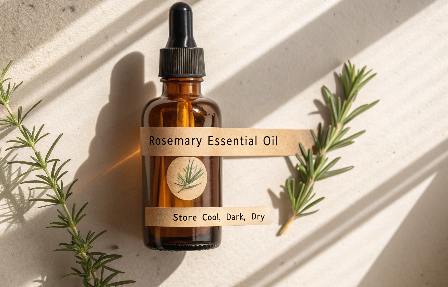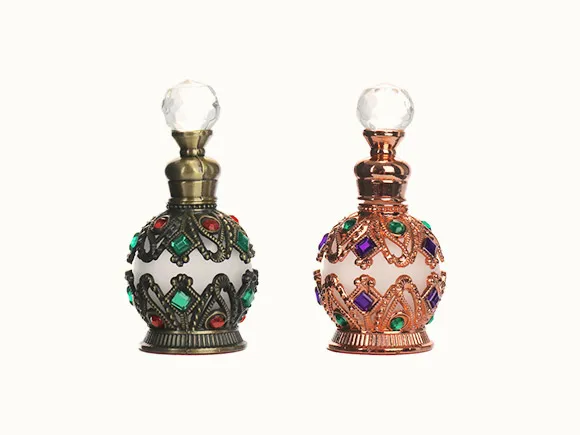Rosemary essential oil is loved for its stimulating scent and scalp-care benefits—but like all essential oils, it can lose potency if stored poorly. To preserve its clarity, aroma, and therapeutic power, you need to treat it right.
Rosemary essential oil should be stored in a tightly sealed, dark glass bottle, kept upright in a cool, dry place away from direct sunlight. Refrigeration is optional but can help extend shelf life.
Here’s how to keep your rosemary oil fresh from the first drop to the last.
Should rosemary oil be refrigerated?
Cool—but not too cold.
Rosemary essential oil doesn’t need refrigeration, but storing it in the fridge can help extend its shelf life, especially in warmer climates or for long-term storage.
Dive Deeper: When Fridge Storage Makes Sense
Refrigeration helps slow down oxidation and maintains the oil’s potency. But freezing or extreme temperature shifts can alter aroma or consistency.
Tips if you refrigerate rosemary oil:
-
Use a tightly sealed amber bottle to prevent condensation
-
Let it reach room temperature before opening to avoid moisture contamination
-
Store in a separate box to prevent odor crossover with food
At PauPack, we offer fridge-compatible bottle options with moisture-resistant labels and air-tight dropper closures, perfect for brands offering oils with longer shelf life expectations.
How to store rosemary essential oil?
It’s all about shielding it from the elements.
Store rosemary essential oil in an amber or cobalt glass bottle with a tight-fitting cap, in a cool, dry place away from sunlight, heat, and humidity.
Dive Deeper: Best Practices for Daily & Long-Term Use
Must-Have Storage Guidelines:
| Factor | Storage Rule |
|---|---|
| Light | Use dark glass to block UV |
| Heat | Keep under 75°F (24°C) |
| Air | Minimize exposure—cap tightly |
| Moisture | Avoid storing in bathrooms or kitchens |
Ideal storage locations:
-
Drawer or cupboard
-
Essential oil organizer box
-
Fridge (optional for extra longevity)
At PauPack, we offer UV-protective glass, custom box inserts, and tamper-evident closures to ensure your rosemary oil stays safe from external threats.
Should essential oils be kept in the fridge?
It depends on the oil and the environment.
Essential oils don’t require refrigeration, but storing delicate or citrus-based oils in the fridge can help preserve freshness. Rosemary oil may benefit if stored long-term.
Dive Deeper: Oils That Benefit Most
| Oil Type | Refrigeration Recommended? |
|---|---|
| Citrus oils (lemon) | ✅ Yes |
| Floral oils (jasmine) | ✅ Optional |
| Rosemary | ✅ Optional |
| Thick oils (vetiver) | ❌ No – room temp is best |
Use dark glass bottles, and avoid frequent fridge-to-room cycles—they introduce condensation, which can spoil the oil.
PauPack’s fridge-safe oil packaging includes airtight pump and dropper closures, tested for humidity resistance.
How long does rosemary oil last once opened?
It’s stable—but not immortal.
Rosemary essential oil typically lasts 2–3 years after opening when stored properly.
Dive Deeper: Signs It’s Time to Toss
-
Aroma smells flat, sour, or different from when first opened
-
Oil becomes cloudy or thickens unnaturally
-
Skin reacts more strongly to the same blend
To track usage and freshness:
-
Label with the open date
-
Store away from heat, moisture, and light
-
Rotate older bottles forward
At PauPack, we offer packaging solutions with date label fields, batch tracking, and QR code traceability so your customers always know the age and condition of their oils.
Conclusion
To keep rosemary essential oil fresh and effective, store it in a dark glass bottle, tightly sealed, and away from light and heat. Fridge storage is optional but helpful. At PauPack, we provide packaging designed to preserve every drop of your rosemary oil—so your blends stay bold, safe, and shelf-ready.














